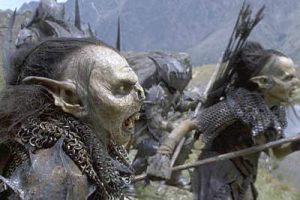Previously we looked at what the Taurat means when it says that Allah created people in His image. This explains why human life, including yours, is precious. However, the Holy Books continues on from our creation to point out a serious problem. This Psalm in the Zabur reveals this so clearly.
The Lord looks down from heaven
Psalm14:2-3
on all mankind
to see if there are any who understand,
any who seek God.
3 All have turned away, all have become corrupt;
there is no one who does good,
not even one.
This says that ‘all’ of us have ‘become corrupt’. Though we were ‘made in the image of God’ something has wrecked this image in all of us. We see corruption in a chosen independence from Allah (‘all have turned aside’ from ‘seeking God’) and also in not doing ‘good’.
Thinking Elves and Orcs

To understand this, compare orcs and elves from the movie Lord of the Rings. Orcs are ugly and evil. Elves are beautiful and peaceful (see Legolas). But orcs had once been elves that Sauron had corrupted in the past. Sauron wrecked the original elf image in the orcs. In a similar way the Bible says that people have become corrupted. Allah had made elves but we have become orcs.
For example, we know ‘right’ and ‘wrong’ behaviour. This comes from being made in the image of the Creator. But we do not consistently live by what we know. It is like a computer virus that damages the proper workings of a computer. Our moral code is there – but a virus has infected it. The Taurat starts with people as good and moral, but then also corrupted. This fits with what we observe about ourselves. But it also brings a question: why did Allah make us this way? We know right and wrong yet are corrupted from it. As the atheist Christopher Hitchens complains:

“… If god really wanted people to be free of such thoughts [i.e., corrupt ones], he should have taken more care to invent a different species.”
Christopher Hitchens. 2007. God is not great: How religion spoils everything. p. 100
But he misses something very important. The Taurat does not say that Allah made us this way, but that something terrible happened after He made us. The first humans revolted against their Creator and in their rebellion they changed and became corrupted.
Sin – Corrupting our Original Image.
Previously, we used the Egyptian 100 pound note with an image of the sphinx to reflect on ‘images’. That sphinx, both in reality and also in its image on the currency has changed from its original creation. Now the nose is missing and the figure is deformed in various ways. The sphinx, though still recognizable and awe-inspiring, is degraded and corrupted from its original state. Similarly, the Taurat declares that something happened to corrupt our original image. But it was not just the passage of time like which deformed the sphinx from its original form. Instead, sin corrupts the original image in which Allah made us.
The Taurat describes us as corrupted from the image Allah made us in. How did this happen? Shortly after being made ‘in the image of God’ the first humans (Adam and Eve) were tested with a choice. Shaytan, the spirit enemy of Allah, tempted them. In the Bible, Shaytan usually speaks through someone. In this case he spoke through a serpent:
Now the serpent was more crafty than any of the wild animals the Lord God had made. He said to the woman, “Did God really say, ‘You must not eat from any tree in the garden’?”
2 The woman said to the serpent, “We may eat fruit from the trees in the garden, 3 but God did say, ‘You must not eat fruit from the tree that is in the middle of the garden, and you must not touch it, or you will die.’”
4 “You will not certainly die,” the serpent said to the woman. 5 “For God knows that when you eat from it your eyes will be opened, and you will be like God, knowing good and evil.”
6 When the woman saw that the fruit of the tree was good for food and pleasing to the eye, and also desirable for gaining wisdom, she took some and ate it. She also gave some to her husband, who was with her, and he ate it. 7 Then the eyes of both of them were opened, and they realized they were naked; so they sewed fig leaves together and made coverings for themselves.
Then the man and his wife heard the sound of the Lord God as he was walking in the garden in the cool of the day, and they hid from the Lord God among the trees of the garden. 9 But the Lord God called to the man, “Where are you?”
10 He answered, “I heard you in the garden, and I was afraid because I was naked; so I hid.”
11 And he said, “Who told you that you were naked? Have you eaten from the tree that I commanded you not to eat from?”
12 The man said, “The woman you put here with me—she gave me some fruit from the tree, and I ate it.”
13 Then the Lord God said to the woman, “What is this you have done?”
The woman said, “The serpent deceived me, and I ate.”
Genesis 3:1-13
Their choice (and temptation), was that they could ‘be like God’. Up to this point they had trusted Allah for everything, but now they chose to become ‘like God’, to trust in themselves and be their own god.
In their choice for independence they changed. They felt shame and tried to cover up. When Allah confronted Adam, he blamed Eve (and Allah who made her). She blamed the serpent. No one accepted responsibility.
Sin – Today’s Consequence seen in Every Society
What started that day has continued because we have inherited that same independent nature. Some misunderstand the Taurat and think that we are blamed for Adam’s bad choice. The only one blamed is Adam, but we live in the consequences of his decision. We have now inherited this independent nature of Adam. We may not want to be god of the universe, but we want to be gods in our settings, separate from Allah.
This explains so much of human life: we lock our doors, we need police, and we have computer passwords– because otherwise we will steal from each other. This is why societies eventually collapse – because cultures have a tendency to decay. This is why all forms of government and economic systems, though some work better than others, they all eventually become corrupt and break down. This explains why you and I struggle to do the right but easily do the wrong. Something about the way we are makes us miss the way things should be.
Sin – Missing the Intended Target
That word ‘miss’ sums up our situation. A verse from the Taurat gives a picture to understand this better. It says:
Among all these soldiers there were seven hundred select troops who were left-handed, each of whom could sling a stone at a hair and not miss.
Judges 20:16
This describes soldiers who were experts at using slingshots and would never miss. The Hebrew word translated ‘miss’ above is יַחֲטִֽא . It is also translated sin through the Taurat.
The soldier takes a stone and shoots it to hit the target. If he misses he has failed his purpose. In the same way, Allah made us in His image to hit the target in how we relate to Him and treat others with love. To ‘sin’ is to miss this purpose, or target, that He intended for us.
This missed-the-target picture is not happy or optimistic. People sometimes react strongly against the Taurat’s teaching because they do not like it. But what does ‘liking’ something have to do with its truth? You do not like taxes, wars, or earthquakes – no one does – but that does not make them untrue. We can’t ignore any of them. All the systems of law, police, locks, and security that we have built into society to protect us from each other suggest that something is wrong.
Sin – Keeping us from Paradise
Because of the many problems in this world, many long for paradise. They hope that things will be better there. The Zabur, in the next chapter after the one describing our current corruption says the following about entry to Paradise.
1 Lord, who may dwell in your sacred tent?
Who may live on your holy mountain?2 The one whose walk is blameless,
who does what is righteous,
who speaks the truth from their heart;
3 whose tongue utters no slander,
who does no wrong to a neighbor,
and casts no slur on others;
4 who despises a vile person
but honors those who fear the Lord;
who keeps an oath even when it hurts,
and does not change their mind;
5 who lends money to the poor without interest;
who does not accept a bribe against the innocent.Whoever does these things
Psalm 15: 1-5
will never be shaken.
This revelation from Daud PBUH declares that Paradise (living on Allah’s “Holy Mountain”) is reserved only for those who act like he describes. This makes sense because if Allah allows corrupted people into Paradise then we will corrupt that beautiful place like we have corrupted life here. But this also creates a problem because who of us actually lives in these ways?
Our Deliverance Anticipated
We have a problem. We corrupted ourselves from the image Allah made us in. Now we miss the target when it comes to our moral actions. But Allah did not leave us in our helplessness. He had a plan to rescue us, and this is why Injil literally means ‘good news’. Allah first announced it in that conversation with Adam and Eve. We look at this first Good News announcement in the Sign of Adam.